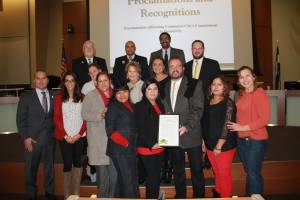Community barn-raising

A look at inclusive participation in action
Haga clic aquí para leer este artículo en español.
How can we work together to solve problems, create robust communities and improve our collective wellbeing? It’s a tall order, and one that is often assigned to our governmental representatives. But, as Peter MacLeod, a Toronto-based expert on citizen engagement points out, the source of public leadership can actually be led by the public – or, as MacLeod sometimes refers to them, barn-raisers.
 “I want to broadly spend less time asking people survey questions and spend more time inviting people to be barn-raisers,” he says. “When you try and raise a barn, people bring different skills.”
“I want to broadly spend less time asking people survey questions and spend more time inviting people to be barn-raisers,” he says. “When you try and raise a barn, people bring different skills.”
For example, some people are good with heights and can hammer timbers from scaffolding, while another person’s skills might help feed workers, move materials or provide first aid.
To help facilitate modern barn-raising, MacLeod works with government agencies and organizations to find creative ways of inviting civic participation into their efforts. To do this, MacLeod has helped organizations to do things like create citizen panels through lotteries, where random people are selected to help serve on councils and help shape their local government through meaningful engagement. In this case, “winning the lottery” is about the opportunity to have your voice be heard – and it’s proved to be a popular win for those selected. And the impacts are significant. Citizen panels have impacted regulation and legislation across Canada, including everything from councillor pay in Alberta to municipal planning policies in Toronto.
“One of the fundamental virtues that come out of community processes and public spaces – where people have the opportunity to meet, to work together, to have to reckon with one another’s ideas and points of views – is that we come to be seen and we see others,” says MacLeod.
Here in Adams County, both Anythink and the CIty of Commerce City have embarked on their own participatory efforts to engage with citizens on how to better shape their services to meet the needs of the public.
Roundtables for the future
Earlier this year, Anythink asked the Adams County community about their vision for the future through a series of 23 roundtables as part of their strategic planning process. These roundtables invited people to share, dream and even design their ideal neighborhoods with posterboard and markers. Participants came from a variety of backgrounds – some roundtables were open to the public, while others included already-organized groups like master gardeners, the League of Women Voters or churches. Attendees were asked a variety of questions, everything from “Do you identify as an urbanite, suburbanite or a rural person?” to “What hopes and dreams do you have for your family?”
The results pointed to a variety of commonalities: people like city centers, small independent businesses and opportunities for their families to get valuable education and vocational training. People also saw the value in finding ways to better connect with their neighbors, and looked to the library as a possible facilitator of those connections, suggesting community-building activities like block parties and forums that the library could help provide or sponsor. Community members were also interested in services like a hands-on science center for kids, cultural and historical museum exhibits and book publishing services. With this information in hand, Anythink is looking ahead to the ways in which it can help fulfill the needs of Adams County residents – and to find ways to continue to engage with the community for their continued input and feedback.
Although the information gathering for Anythink’s strategic plan has now been completed, “Anythink will be hosting conversations like this more periodically to engage our community, evolving our services to stay relevant,” says Steve Hansen, Anythink’s strategic planning consultant. “It helps the library to take a more active role in strengthening the fabric of our community, contributing to the community’s resilience and finding more opportunities for the people who live and work here.”
 Taskforce-led change
Taskforce-led change
As the third-fastest growing city in Colorado, City of Commerce City leaders are looking for ways in which they can build a more inclusive community in the face of rapid growth. One way of working toward that goal is the creation of the city’s Latino Engagement Taskforce (LET), a group comprised of 12 Latina community members that met over the course of six months in 2016 and 2017 to gather constructive and solution-focused participation on how the city can better engage, involve and meaningfully serve its Latino community.
“The Latino community is such an important part of what makes Commerce City a unique and richly diverse city,” says Julia Virnstein, spokesperson for the City of Commerce City. “As a city, it’s important we’re engaging with this community to better understand their needs and desires.”
To put this into action, the all-female LET members identified issues and topics of interest for meaningful community outreach – everything from police interaction to education to city events and communication. Systemic barriers – including language – or cultural misunderstandings have been documented as preventing diverse communities from civic engagement. For the LET, the idea was to remove those barriers and set forth recommendations based on community feedback. By hosting these meetings, the LET was able to gather information critical to helping the City of Commerce City be more inclusive of its Latino population.
The biggest takeaway from this taskforce, according to their report, is that the city can do a better job engaging with the Latino community in all areas of government, especially by providing information in Spanish. Since then, the city has already put its findings into action by conducting Spanish-only telephone town halls on topics like immigration and city services and ensuring high-quality Spanish translation for all materials.
With this inclusive participation in action, already impacting the way the city serves its residents, the City of Commerce City sees this resident-led impact as a trend worth continuing. ■
Send your questions or feedback to ithink@anythinklibraries.org or post in the comments below.

